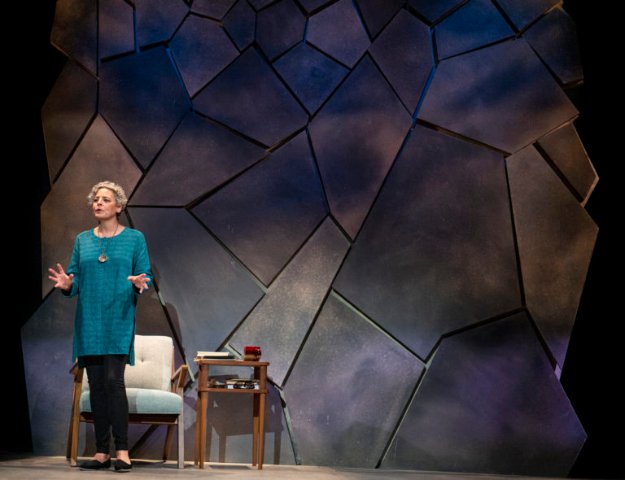The Year of Magical Thinking
Joan Didion Produced by Aurora Theatre
By: Victor Cordell - Jul 02, 2019
Virtually all of us who have a loving circle and live to a certain age will face the tragedies of loss among our loved ones – whether through death, debilitating illness, or impaired mental capacity. Distinguished author Joan Didion shared co-dependent relationships with her husband, John Gregory Dunne, also a distinguished author and her frequent collaborator, and with her adult daughter, Quintana Roo. In late 2003, Quintana Roo contracted a series of serious diseases that defied satisfactory treatment and resulted in recurring hospitalization and frequent comas. At the end of the year, with Quintana Roo comatose, Dunne, died suddenly. As Didion would observe, life can change in an instant. In that brief time, her familial and professional support systems of several decades collapsed. And the misfortune of dealing with Quintano Roo was far from over.
Many writers mine misfortune as fuel for their pens. And who is more gifted than Joan Didion to memorialize and dramatize these sad events? Her autobiographical reflection as a non-fiction book, The Year of Magical Thinking, received broad acclaim, and the following one-woman stage adaptation has been applauded in New York, London, and elsewhere.
Although the title may give the impression of being fanciful, magical thinking is a very specific anthropological/psychological characterization, especially associated with primitive cultures. It embraces the notion that if a person thinks and wishes a thing to occur that those mental processes can actually cause it to happen. In fact, a core issue of this work concerns coping strategies and irrational hopes of the grieving.
A frequent comment about survivors is that the true impact of loss of a loved one is much delayed. One reason for this is the powerful impact of denial. Perhaps it didn’t really happen. Perhaps it was a dream. And perhaps if I do certain things and don’t do certain other things, the loved one will un-die. In fact, this is the totally irrational magical thinking dilemma that Didion faces. And this, despite the fact that she is revealed as being rigorously systematic and ruthlessly logical. And while she seeks to find reversible errors in every investigation, she knows at a rational level that her loss is not reversible. Even in an act as mundane as discarding the clothes of her deceased husband, she emotionally attaches to them in thinking that John will have need for them on his return.
Joan Didion’s name is familiar to many informed people, but her demeanor is not. Thus, an actor portraying her is allowed a certain amount of latitude. In contrast, audiences witnessing a portrayal of, say, John F. Kennedy, may be very sensitive to the preciseness of the Boston accent and the handsome, square jawed appearance of the actor.
In the case of Didion, the fine actor Stacy Ross is able to play her in a style that is comfortable, which is basically an imitation of – Stacy Ross. As expected, she gives an exemplary, if understated, performance. And this stage characterization may supplant any prior schema that the observer may have had of Didion. The even keel approach is a nod toward Didion’s stoic nature, which should call for limited acting affect. It also reflects the author’s measured storytelling style. Ross does weep quietly more than once. While the audience responds favorably to the emotion which seems appropriate and genuine, stage directions actually eschew crying, as if Didion’s reflective and incisive ways leave no room for emotional escape.
Joan Didion has crafted an engaging peek into her soul at a time of great tribulation, though there are numerous flashbacks to earlier times which flesh out her personal attributes and relationships and offer colorful vignettes from her past. She is unembarrassed to discuss some of her own foibles, including her frequent arguments with her beloved husband, despite what appeared to be an excellent professional working relationship of equals, largely free of ego combat. Yet, she does otherwise reveal her driving need to be right in every discussion or argument, a habit that did create resentment from Dunne. It is unlikely that this characteristic has changed since the death of her loved one.
The Year of Magical Thinking by Joan Didion is produced by Aurora Theatre and plays at its stage at 2081 Addison St., Berkeley, CA through July 21, 2019.
Posted courtesy of For All Events.

